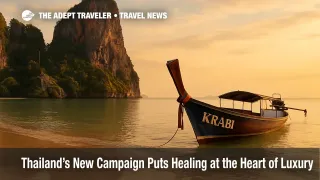Thailand's New TAT Campaign Puts Healing at the Heart of Luxury

The Tourism Authority of Thailand has launched a new "Amazing Thailand" campaign built around the idea that healing is the new luxury. Under the banner "Unforgettable Experience: Healing is the New Luxury," the effort reframes high-end travel away from status and toward personal renewal, whether that is a sunrise on a quiet beach, a bowl of tom yum, or a day learning local crafts. The campaign debuts alongside concrete sustainability tools and pilots, signaling that traveler wellbeing and environmental stewardship are meant to advance together.
Thailand's new luxury, explained
TAT's creative centers the small, restorative moments that travelers actually remember, and it widens "wellness" beyond spa menus. In official materials, Thailand links this ethos to measurable sustainability, using two frameworks already in motion, the Sustainable Tourism Goals STAR rating, which aligns to the United Nations SDGs, and CF-Hotels, a national platform for hotels to inventory energy, water, waste, and greenhouse-gas emissions. The aim is to help visitors choose experiences that feel good and do good, then verify that impact with real data from operators.
Krabi as the national pilot
Krabi is the country's prototype for scaling responsible tourism. At the Global Meaningful Travel Summit in September, officials highlighted Krabi's expanding group of certified and awarded operators, and the province's steady shift toward community-led experiences like long-tail boat co-ops and local batik workshops. Recent tallies cited more than 100 STAR-certified businesses in the province, with 16 operators recognized by the Thailand Tourism Awards, and dozens of hotels actively using the CF-Hotels platform to cut emissions and waste. The pilot's purpose is simple, build a replicable playbook that other destinations can adopt without losing their local character.
How the ratings and maps work
Background. Thailand's STGs STAR program is a sustainability rating inspired by the UN Sustainable Development Goals. It awards three to five stars based on criteria that span governance, socio-economic benefits, culture, and the environment. For travelers and travel advisors, the stars function as a quick signal that an operator is working to recognized standards. CF-Hotels complements that with bottom-up measurement, asking properties to track resource use and calculate their carbon footprint, then improve. Together they create a visible "floor" for good practice and a pathway to push leaders higher.
Beyond domestic tools, Thailand has partnered with Tourism Cares on the Thailand Meaningful Travel Map. The map is a vetted directory of community-based and sustainable businesses that the trade can book and promote now, giving international partners a single place to find credible impact experiences that fit the new campaign's wellness-meets-responsibility message.
Recognition and momentum
Thailand's long-running national awards program is being used to recognize environmental leadership alongside service and experience quality. The awards give travelers another shorthand for responsible choices, and they reinforce the STAR and CF-Hotels ecosystem by spotlighting early adopters. Krabi's growing list of award winners underscores why it was chosen to lead the national pilot, and why elements of the model are likely to roll into other provinces next.
Final thoughts
By linking a human-scale definition of luxury to transparent sustainability standards, Thailand is trying to take wellness out of the brochure and into everyday travel choices. If the Krabi prototype and national tools continue to expand, "Healing is the New Luxury" could become less of a slogan and more of a playbook, one where personal renewal and planetary health advance in lockstep.
Sources
- TAT launches new TVC - Unforgettable Experience: Healing is the New Luxury
- Thailand drives journey to sustainable tourism leadership
- CF-Hotels initiative reiterates TAT's push towards sustainable tourism
- CF-Hotels, online platform to enable hotel and lodging operators to create a database of environmental inventory
- Krabi Prototype takes centre stage at 2025 Global Meaningful Travel Summit in Thailand
- Krabi Prototype takes centre stage, progress figures
- Thailand Meaningful Travel Map, Tourism Cares
- "Healing is the New Luxury," TAT vision at WTM
